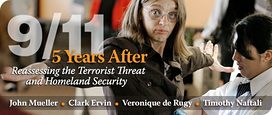I very much like the way Clark Kent Ervin characterizes as “believers” those who, like him, hold that terrorism presents an existential threat to the United States, that terrorists only have to succeed once, that the Big One is going to happen any day now, and that we are vulnerable, vulnerable, vulnerable. As the application of the word suggests, terrorism doomsaying seems now to have moved solidly from the merely alarmist to the truly theological (and far from the sensible, careful policy analysis advocated by Veronique de Rugy).
This was brought home to me in a personal way while watching ABC’s “This Week with George Stephanopoulus” on September 10. At the show’s beginning, Stephanopoulus read a passage from an article I had published in the current Foreign Affairs in which I modestly proposed that “the evidence so far suggests that fears of the omnipotent terrorist reminiscent of those inspired by images of the twenty-foot tall Japanese after Pearl Harbor or the twenty-foot tall Communists at various points in the Cold War may have been overblown. The massive and expensive security apparatus erected since 9/11 may be persecuting some, spying on many, inconveniencing most, and taxing all to defend the United States against an enemy that scarcely exists.” He then asked one of his guests, Thomas Kean, co-chair of the 9/11 Commission, whether that was “heresy,” and Governor Kean replied, “Yeah, I think so because, you know, these people do exist.”
I was criticized, then, not for committing an error of fact or analysis, but for committing heresy: going against received orthodoxy. And my suggestion that the terrorist threat may have been exaggerated was deftly caricatured to suggest I thought it didn’t exist.
For those who find “existential” to be insufficiently theological, many who embrace the received orthodoxy are quick to apply such terms as “apocalyptic” and to predict “Armageddon” to be just over the horizon. Not far off are those, nicely scored by Timothy Natali in his contribution, who imagine the campaign to be a battle for civilization, a long war, a generational conflict, or (depending on how the Cold War is coded) World War III or World War IV. That’s pretty elevated thinking when the total number of people worldwide who have been killed by Muslim extremists outside war zones since 2001 has been smaller than the number of Americans who have drown in bathtubs over the same interval. Those deaths are tragic, outrageous, and deeply regrettable of course, but their numbers do not suggest that the enemy, however vicious, presents a threat of cosmic or biblical proportions.
And for the theologians, the existence of terrorists has, like the existence of God, become an unfalsifiable proposition. Ervin dismisses the fact that the FBI has been unable to find a single true terrorist cell in the United States after years of well-funded effort as conclusive evidence of the agency’s incompetence, even though policing agencies in other countries have somehow been able to roll up quite a few bad guys.
But perhaps theology has been in this from the beginning. Shortly after 9/11, President George W. Bush announced that his mission was now to “rid the world of evil,” a remarkable declaration from a man who had entered office advocating a “humble” foreign policy. The call seems to have stirred no questioning in the press at the time, except maybe for a comment in a New Orleans Times Picayune editorial humbly suggesting that “perhaps the president over promised.”
Theology is seen as well in routine incantations about how the devil is everywhere. The Department of Homeland Security officially proclaims on page 1 of its defining manifesto that “Today’s terrorists can strike at any place, at any time, and with virtually any weapon.” And a day after I had been outed as a heretic, ABC News concluded its fifth anniversary “Where Things Stand” assessment by having Charles Gibson intone, “Now, putting your child on a school bus or driving across a bridge or just going to the mall—each of these things is a small act of courage.” Now I know why I stay away from malls: too many heroes.

